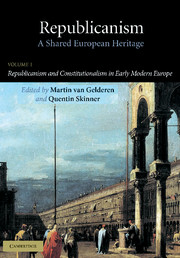Book contents
- Frontmatter
- Contents of Volume I
- Contents of Volume II
- Acknowledgments
- Introduction
- Part I The Rejection of Monarchy
- Part II The Republican Citizen
- Part III The Republican Constitution
- 9 From the Crisis of Civil Culture to the Neapolitan Republic of 1647: Republicanism in Italy between the Sixteenth and Seventeenth Centuries
- 10 Aristotelians, Monarchomachs and Republicans: Sovereignty and respublica mixta in Dutch and German Political Thought, 1580–1650
- 11 Debating the respublica mixta: German and Dutch Political Discourses around 1700
- 12 Classical Foundational Myths of European Republicanism: The Jewish Commonwealth
- 13 Republican Politics in Early Modern Spain: The Castilian and Catalano-Aragonese Traditions
- 14 The Idea of a Republican Constitution in Old Régime France
- 15 Republicanism, Regicide and Republic: The English Experience
- Bibliography
- Contributors
- Index of Names of Persons
- Index of Subjects
9 - From the Crisis of Civil Culture to the Neapolitan Republic of 1647: Republicanism in Italy between the Sixteenth and Seventeenth Centuries
Published online by Cambridge University Press: 15 December 2009
- Frontmatter
- Contents of Volume I
- Contents of Volume II
- Acknowledgments
- Introduction
- Part I The Rejection of Monarchy
- Part II The Republican Citizen
- Part III The Republican Constitution
- 9 From the Crisis of Civil Culture to the Neapolitan Republic of 1647: Republicanism in Italy between the Sixteenth and Seventeenth Centuries
- 10 Aristotelians, Monarchomachs and Republicans: Sovereignty and respublica mixta in Dutch and German Political Thought, 1580–1650
- 11 Debating the respublica mixta: German and Dutch Political Discourses around 1700
- 12 Classical Foundational Myths of European Republicanism: The Jewish Commonwealth
- 13 Republican Politics in Early Modern Spain: The Castilian and Catalano-Aragonese Traditions
- 14 The Idea of a Republican Constitution in Old Régime France
- 15 Republicanism, Regicide and Republic: The English Experience
- Bibliography
- Contributors
- Index of Names of Persons
- Index of Subjects
Summary
The republican experiment which took place in Naples in 1647–8 has led to a thorough historiographical investigation of the internal and international causes of the revolution, and, more recently, of the political models which were discussed and adopted during the republic's brief existence. However, the foundations of the ‘civil’ culture on which Italian republican sentiment was built have thus far been neglected. Contemporary chroniclers and historians saw the choice of a republic as surprising and unlikely, as if the experiment were out of place, in an Italy dominated by the Spanish monarchy and by princely régimes, and outdated, given that the Renaissance tradition had become obsolete and republican political culture had dried up.
In effect, a subtle process of erosion of political principles had already struck at the heart of the ‘civil’ tradition from the middle of the sixteenth century onwards. This erosion signalled a divorce between politeia and everyday politics which was peculiar to the writers of the age of reason of state. ‘The language of politics as civil philosophy was manifesting ever clearer signs of weakness’ (Viroli 1994: 155). The insistence on the power of the prince, characteristic of Counter-Reformation political literature, had considerably obscured the pre-eminence of civitas; in treatises, ‘civil virtue’ had been replaced by political prudence, the ‘citizen’ by the subject, transparency by dissimulation.
- Type
- Chapter
- Information
- RepublicanismA Shared European Heritage, pp. 169 - 194Publisher: Cambridge University PressPrint publication year: 2002
- 5
- Cited by



